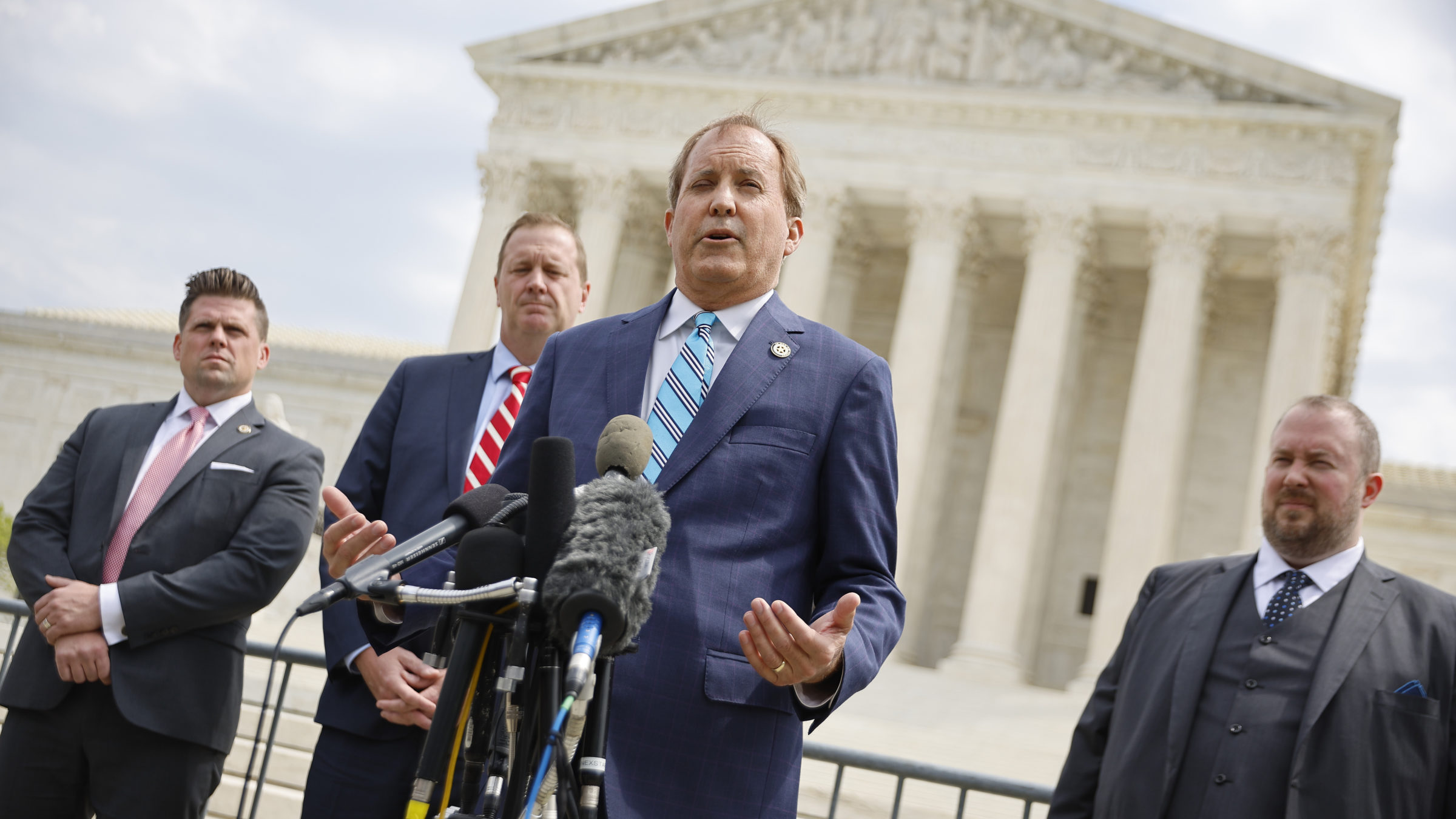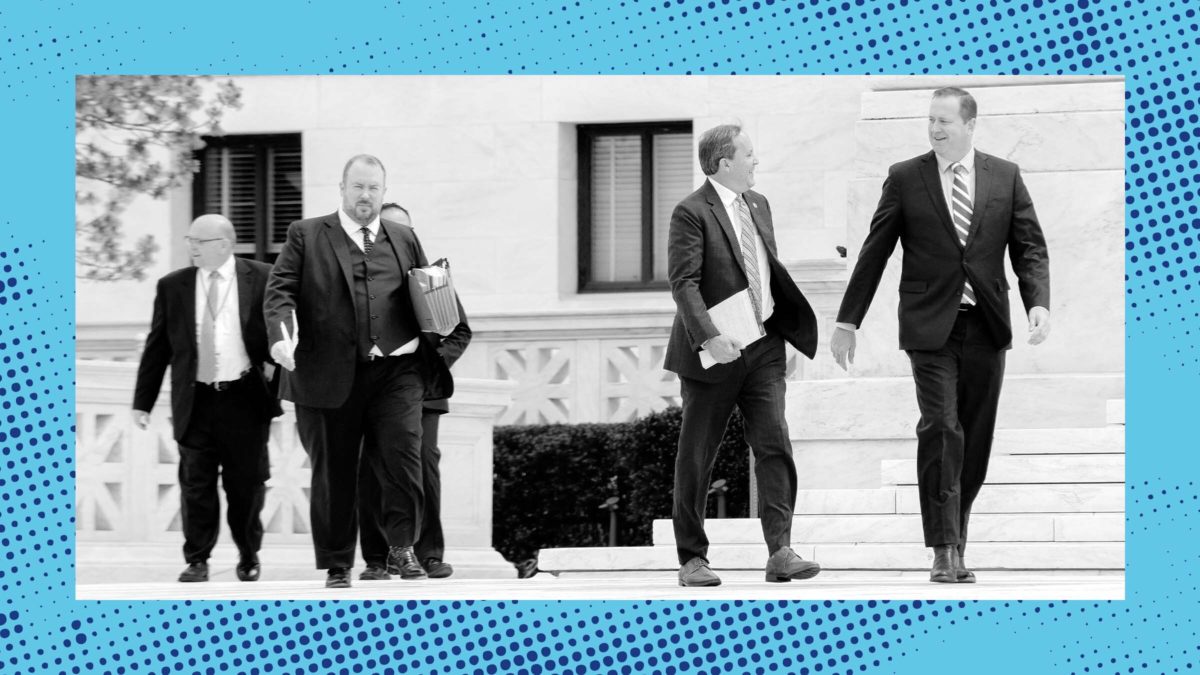Editor’s note: This month, we’ll be taking a closer look at some of the most consequential cases the Supreme Court—the most conservative Supreme Court in a century—will decide in its upcoming term. Today: United States v. Texas, a case about whether the person in charge of federal immigration enforcement is the President of the United States, or some FedSoc goofus in Texas.
The demonization of immigrants is as characteristic of the Republican Party as the cartoon elephant. Starting with his run for president in 2016, Donald Trump made casual xenophobia a mainstay of his political platform, framing immigrants as dangerous plunderers, insatiable job thieves, or both. In 2018, he questioned why the U.S. was accepting immigrants from “shithole countries” like Haiti and El Salvador. In his 2019 State of the Union address, he proclaimed that the U.S. has “a moral duty to create an immigration system that protects the lives and jobs of our citizens.”
Now, the notion that immigrants are parasites on the U.S. economy is popping up in federal courtrooms across the country, and conservative judges are taking the bait. The latest lawsuit framing the presence of migrants as a legal injury for GOP-controlled states is United States v. Texas, in which the Court will hear oral argument in early December.
In September 2021, President Joe Biden’s Department of Homeland Security relaxed the “zero tolerance” Trump-era immigration prosecutorial guidelines that made any and every undocumented person vulnerable to deportation. Instead, DHS announced that it would prioritize deporting people who are a “threat to our national security, public safety, and border security.” This milquetoast language was unacceptable to the Republican attorneys general of Texas and Louisiana, who sued to block it from taking effect.

Texas Attorney General Ken Paxton talks to reporters with Missouri Attorney General Eric Schmitt (second from left) and Texas Solicitor General Judd Stone (right) after Supreme Court oral argument in a different anti-immigrant lawsuit against the Biden administration in April (Chip Somodevilla / Getty Images)
In June, Drew Tipton, a Trump-appointed district court judge in Texas, agreed, issuing a nationwide injunction that blocked Biden’s guidelines from taking effect. In his opinion, Tipton held that Texas “possesses a quasi-sovereign interest in protecting its citizens from the criminal activity of aliens,” and had demonstrated that it incurred costs related to detaining immigrants whom DHS had decided not to incarcerate. In other words, the judge allowed the attorneys general of two Republican-controlled states to commandeer federal immigration enforcement by claiming that Biden wasn’t doing a good enough job at caging and deporting these pesky immigrants.
Tipton also ruled that the use of prosecutorial discretion in Biden’s guidelines violated federal immigration law, and would continue to do so until DHS detains every single immigrant with criminal history or a deportation order on their record. The Fifth Circuit Court of Appeals upheld the injunction, claiming that Texas’ economic injuries are “difficult to deny.” Now, the Supreme Court will sort out this mess, deciding whether the states have standing to bring this lawsuit forward; whether Biden’s guidelines violate immigration law; and whether Tipton, an unelected judge who previously practiced employment law, had the authority to issue a nationwide injunction in the first place.
The framing of immigrants as a drain on state resources is an oft-repeated refrain in the right-wing media circuit. In a 12-week study of weekday Fox News segments in 2021, the nonprofit Media Matters for America identified nearly 150 suggesting that migrants are an “economic drain on Americans.” In 2015, Fox News touted a report by the extremist anti-immigrant group, Federation for American Immigration Reform, which claimed that “illegal immigration” costs the U.S. up to $113 billion a year. Trump would repeat and augment this figure throughout his presidency: In 2018, he tweeted that “our Country losses [sic] 250 Billion Dollars a year on illegal immigration.” Later that year, that number magically ballooned to $275 billion.

When you’re super good at math (Photo by Alex Wong/Getty Images)
While in office, Trump and his Department of Homeland Security promulgated immigration policies that bolstered the narrative of immigrants as leeches on the U.S. economy. In 2020, he dramatically expanded the definition of a “public charge,” a basis for denying legal status to anyone whom DHS deems likely to be ”unable to take care of himself or herself” without government assistance, including healthcare, nutrition, and housing programs. The law, which a federal court rejected in November 2020 and which Biden eventually rescinded, had a chilling effect on immigrants more broadly, prompting even those who were exempt from the regulation, like refugees and asylum seekers, to withdraw from services to which they were entitled.
At the state level, Texas has long devoted its resources to persecuting immigrants. Lawsuits from Republican attorneys general claiming that federal immigration policy is harming the state’s economy date at least to 2014, when then-AG Greg Abbott sued to block President Barack Obama’s Deferred Action for Parents of Americans guidelines. The state was coerced into “heavy spending” to reinforce border militarization, he argued, because DAPA “contributed to the surge of illegal immigration by refusing to enforce the laws on the books.” Since taking office in 2015, the current AG, Ken Paxton, has sued under this economic injury theory nearly a dozen times.
The truth is that the government imposes many restrictions on immigrants receiving public assistance. Undocumented people are ineligible for social programs like SNAP, Medicaid and Supplemental Security Income, even though they pay into many of these services. (Even lawful permanent residents often must wait years years before becoming eligible for these programs.) In 2016, the Perryman Group, a Texas-based economic research group, estimated that the work of undocumented immigrants contributes a net benefit of $290 billion to the state’s economy, even after adjusting for the government aid they receive.
Despite an intervening change of presidential power, Tipton’s decision has enabled ICE agents to reinstate some of Trump’s policies as if he never left office. In the weeks after his decision put Biden’s guidelines on hold, The Los Angeles Times reported that Immigration & Customs Enforcement had increased deportations of people who would likely have been categorized as low-priority under Biden’s guidelines. Just last month, they attempted to deport a 10-year-old battling cancer and his mother.
Conservative attorneys general have been working hard to render the results of the 2020 presidential election moot, both generally and also specifically when it comes to migrants’ rights. United States v. Texas is yet another bid to siphon power from the branches of government that are accountable to voters to the branch that is not. Thanks to a federal judiciary packed at all levels with conservative ideologues willing to entertain arguments like these, it certainly won’t be the last.

